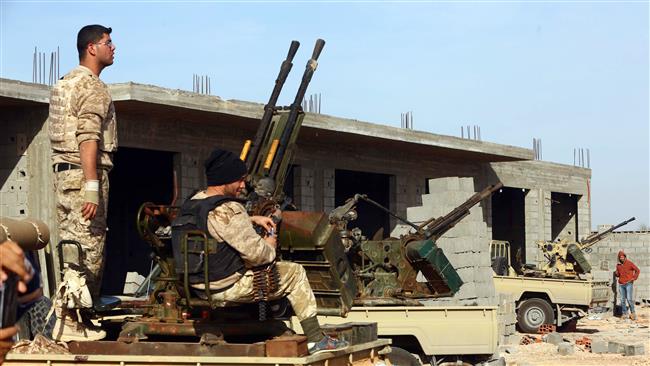Libya factions still far from agreement

The United Nations (UN) special envoy to Libya says the warring factions in the North African country are still far from reaching an agreement to put an end to deadly clashes in the country.
“An agreement is going to be difficult, we are still a long way off,” Bernardino Leon told Spanish newspaper El Pais on Saturday.
The UN official added that there are some “hardliners” in both sides of the Libyan conflict who prefer a military solution to a diplomatic one.
“In both camps, there are the hardliners and the moderates.… The moderates want to reach an agreement, while the hardliners prefer a military solution, they want to impose it on the other party by force,” Leon said, adding, “The international community can’t accept such an outcome.”
He also criticized the international community for failing to play an influential role in the Arab country following the 2011 uprising which toppled long-time ruler, Muammar Gaddafi.
“What the international community didn’t do well after the 2011 intervention is not to stay on the ground. It wasn’t about rebuilding a state, it was about building one from scratch,” said the UN envoy, in reference to the NATO airstrikes which precipitated the dictator’s downfall during the uprising, but paved the way for the emergence of a number of terrorist groups in the African country.
His remarks came as Libya’s warring factions are taking part in UN-brokered peace talks in the Moroccan coastal town of Skhirat.
According to Leon, the talks, which kicked off on Friday and are due to wrap up on Sunday, seek three purposes: to establish a national unity government, address security issues in the war-torn country and initiate confidence-building measures on both sides of the conflict.
“By Sunday, we would like to have these three documents ready and if possible, published, as already agreed [as] part of what will be a final package,” he said on Friday.
Source of conflict
Libya has two rival camps vying for control of the country, with one controlling Tripoli, and the other, Libya’s internationally recognized government, in control of the cities of Bayda and Tobruk.
Libya’s government and elected parliament moved to the eastern city of Tobruk after an armed group based in the northwestern city of Misrata seized Tripoli and most government institutions in August 2014.
Armed militants sit on a pick-up truck mounted with a machine gun in Libya’s coastal city of Sirte, March 15, 2015. © AFP
Libya plunged into chaos following 2011 uprising against the dictatorship of Gaddafi. The ouster of Gaddafi gave rise to a patchwork of heavily-armed militias and deep political divisions.
The country has been witnessing numerous clashes between government forces and rival militia groups, which refuse to lay down arms.
ISIL enters the equation in Libya
The presence of ISIL Takfiri terrorists in Libya has further complicated the situation in the violence-wracked North African country.
The terrorist group, which controls some regions in Iraq and Syria, has also launched operations in Libya.
The ISIL terrorists parade through the streets of the Libyan coastal city of Sirte, February 18, 2015. © AFP
In February, 45 people were killed and dozens of others injured in ISIL’s triple bomb explosions that struck Libya’s northeastern city of al-Qubah.
In the same month, the Takfiri group also released a video showing the beheading of 21 Egyptian Christians in Libya. The victims had reportedly been abducted in Libya’s northern coastal city of Sirte in two attacks in December and January.







